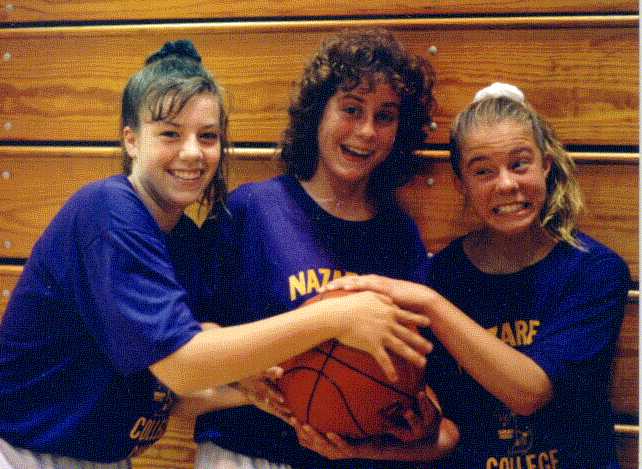



I met her when she was just a little girl. A big smile, bright eyes, giggling for no reason.
She was scared and unsure of herself. She questioned her ability, and would put herself
down more often than not. She would tell me how terrible she looked. (She didn't.)
I yelled at the team in practice and it shocked her, put her near tears--even though it was
directed at the varsity players. She had no confidence in her ability; everyone looked
better than she (she thought). She'd hang her head after a mistake, forgetting that she had
succeeded many times before. She had to be reassured constantly, but it never seemed
to work. She listened respectfully, never questioned, always did what she was asked--and
worried.
A year later she seemed more confident. You could see a spark of maturity, and then she
would giggle--reminding me she was still that little girl. I once yelled at practice, and this
time at her. She was hurt and she wouldn't talk to me for a day or two. And she still hung
her head when she didn't perform up to expectations. Though she was assured she had
improved 100%, she couldn't be consoled. She felt that she alone cost the team a victory.
Each season seemed to overlap the one before, and all of a sudden it was her last. I look
at her, my new senior. Her skills have improved dramatically. She is not intimidated any
more, and she will never miss an opportunity to poke fun at me or at what I am wearing. She
is comfortable. The shyness is gone and her face glows with confidence. I intentionally pick
on her in practice. I want her to set an example, show the other players how to take criticism.
She grimaces when I continue to carp at her, but she uses her anger to play with more
intensity. Later on, she will laugh with me or, more often at me, but it will only be her
way of telling me that she knows I care about her and I'm only trying to make her a better
player. I look at her and feel proud. She doesn't need my reassurances any more. I struggled
for three years to help her gain confidence and now, suddenly, I miss her total dependence
on me for positive comment.
At practice, I see her helping a freshman with her shot. She is patient. I hear her saying the
same things I once said to her. The freshman is thrilled to have a senior help her, not
realizing that four years earlier her hero had looked up to someone, too. When she sees I'm
having a bad day, she will write me a note or come over and talk to me, asking if I'm okay.
She reassures me and lets me know that my efforts are appreciated.
I look hard for the "little girl" I once knew, but she is gone. I find a confident young woman,
thinking of others before herself. She doesn't know she has done more for me than I ever did
for her. When she leaves, her life will be just beginning and chances are I may never see her
again. I know I can look forward to a letter or phone call now and then, and that will make my
day. ("She remembers!") But the precious relationship will be gone.
For now, though, her last game is approaching and I am already beginning to miss her. I get
too attached. I really wonder whether it's worth going through this kind of thing anymore.
An older player introduces me to an eighth grader and tells her that I will be the girl's coach
next year. The kid smiles, but doesn't speak. I ask her if she is excited about playing. She
tells me she is not very good . . . and giggles. Maybe I'll coach one more year.
I have been coaching girls in high school sports for 17 years and I find it extremely rewarding.
The memories of all the drills, practices, and games won or lost seem to fade, but the emotional
attachments last forever. I have been very fortunate to have coached so many special young
ladies, and this article is my way of thanking them.
Sincerely,
Michael L. Smeriglio


The same is true of people. It has been said the difference between people of achievement and those of mediocrity is a difference of only about one percent study, application, interest, attention and effort. A mere one percent can be the slight edge which separates winners from losers!! A slight edge might be all that is necessary for you to achieve and enjoy your vision of success. So you might be as valuable as a horse, even a horse like Nashua, once you gain that slight edge.

|

|

|
My friend, Hammer, always slow to his left but quick on the trigger, became a basketball
coach last month, the realization of a dream we used to toss back and forth on a thousand
summer nights when our bones ached and our brows dripped but we hungered to play more,
play harder, for as long as they'd keep the lights on for us.
Neither of us has ever been able to shake the feeling. Neither of us have subsequently gone
and gotten "real" jobs, like most of our friends, and I am proud of that. Because the hours we
spent diving on melting pavement on those summer nights, they weren't merely to work up a
sweat. No, they were hours spent working at a craft. Honing it. Living it. Dreaming about it.
I write about it now. He still lives it, and it's a wondrous thing to behold. I haven't talked to him
since he got his new job, as the JV coach at St. Anthony's High on the Island, but I know. I know
the feeling of the smile flashed so often, it cramps your lips. The feeling of stealing money, you
enjoy your job so much. The feeling of staying close to a game that has so defined you, given
you more hours of happiness and hope than anything else in your world. It's a wondrous game,
basketball is, that it can give two out of shape, underskilled dreamers a chance to stay close by,
smell the gym, hear the squeaks of the sneakers, taste the excitement. A wondrous game indeed.
I hope Hammer keeps these feelings forever close to his heart. I hope the winning--and the
losing--don't obscure what it was that drew him to where he is now. Hammer could always shoot
the basketball with the best of 'em, and would stay in front of a backboard for hours and hours out
of love, out of joy. Out of passion. The sort of passion that makes you want to share with others.
With kids, mostly. That's what coaching is really about. You have something you want to share
and you share it. You teach it, while at the same instant you never quit learning about it. Stealing
money, nothing less.
Coaches have been stripped of that feeling before, and always will, as long as there are
scoreboards to measure the worth of men. And that is a shame, because winning basketball
games was not the reason most of them got into the racket in the first place. Teaching it was.
Staying close. Staying involved. Transferring your passion to a new generation of interns. Naive?
Absolutely. And it's a pity that it is so.
In a year's time, maybe two, people will look at the Tom Chapman era at St. Bonaventure and
measure it in only one way: how many wins he stockpiled. They do that now, with Ron DeCarli,
with Jim Satalin, with Larry Weise. All the hours, spent teaching the fundamentals, the basics,
mean nothing. They are all judged by how many times they won the games they coached. How
sad. How very sad.
And we wonder, as a sport-soaked society, why things go wrong. We wonder how the wise-cracking
good guy, Jimmy Valvano, could go from being America's darling to America's most wanted in
seven short years. How? Because the twitching, nervous man that stood before a crowded pool of
media last spring after ending his tenure at North Carolina State was a businessman, a shady one
who got caught. This wasn't the same kid from Seaford, Rocco Valvano's boy, who came to
national prominence at Iona because his bunch of overachieving kids actually liked each other, and
loved their basketball. Success chanced Jim Valvano, as surely as it changed Ivan Boeskey and
Michael Milken, tax bracket neighbors by the end.
So as my buddy Hammer embarks on his dream--on our dream--I wish him nothing but luck as he
starts this wicked, swirling journey. I hope he can enjoy the ride, enjoy the kids, enjoy the game and
all its majesty. But I suppose if he's going to be successful, I hope most of all that he can teach
defense a whole lot better than he played it.
--by Mike Vaccaro
Olean (NY) Times Herald Sports Writer


If you aren't getting as big a jolt as you'd like from life, get yourself a dream. You are the only expression of life that has that ability. It is, in fact, your ultimate obligation. Where there is no hope, no higher direction or noble purpose towards which a life is growing, then, for all meaningful purposes, life's current is not flowing.
Other forms of life have the dreams built in. An acorn will someday become an oak tree, the wheat seed will flourish into golden grain, the lion cub will undeniably grow to be king of the jungle. How about you? What will be your destiny? I'll tell you. It will be a realization of your dreams. As James Allen writes: "Dream lofty dreams, and as you dream, so shall you become. Your vision is the promise of what you shall one day be. One who cherishes a beautiful vision, a lofty ideal, will one day realize."
Be brave with your dream! Don't wait for someone else to do it before you dream it! Robert Perry aspired to be the first to set foot at the North Pole. Alexander Mackenzie wanted to do what no American had done--cross the continent on foot. Nellie Bly dreamed of being the first woman to go, alone, around the world. The world needs dreamers like that. Organizations need them. People who look beyond the limitations of their lives, fasten their thoughts on their dreams and then rise each morning to the levels of their visions, make miracles happen.
Such a person was wirey Bob Beamon who, before 40,000 people in Mexico City on October 18, 1968, raced down the runway, pounded his foot against his takeoff point and leaped into the air. Olympic records are improved by fractions of seconds or inches. But when he landed, the old record had been shattered by two feet, an unmatched achievement in athletic history.
It doesn't always happen to the young. In 1968, Bill Emmerton, in his late 40's, decided to run 125 miles through Death Valley. He started in the heat of 106 degrees, got 30 miles out and encountered a sandstorm so severe it blew him off his feet and bounced him15 feet along the road. Undaunted, he kept going until he collapsed from sulfur fumes. Following him in a camper, his wife, Norma, thought, "Dear God, this is it." She soaked his clothes in water, massaged his legs, and three minutes later Emmerton was on his way again. The temperature reached 135 degrees. He finished with the toe of one shoe cut off to allow for the free flow of blood. "It was like running through hell," he exclaimed. "I suffered. I was in pain. But no one else can stand it as I do."
Seeing only starts can fill one's heart with hope and expectancy. Tawny Elain Godin, 18 years old, in 1975, was named Miss America. When Bert Parks placed her crown on her head and told her, "Now you may make your walk," she replied, "This should be easy for me. I have been doing it in my mind since I was five years old!" She was testifying to the mysterious phenomena that if you look to a dream, nurture it, and hold it close to your heart then what you see, you will most certainly experience.
Your dreams are the wings of your thoughts; they lift your thinking out of the commonplace and the ordinary. Belief and dedication motivate, but dreams inspire! Your dreams of tomorrow will make today's problems seem unimportant. Dreams take the dullness out of work, the aggravation from problems and the hopelessness from lack. They are the cups that hold your efforts. Your cup will truly "runneth over" with your dreams fulfilled unless you let others punch holes in them! So hold fast to your dreams! They are the harps of the heart that add music to your everyday existence!
by Bob Conklin
The Bench WarmerThe radio screams and the papers print reams for the player who carries the ball,While never a word is written or heard of the players who sit through it all. But there on the bench a dozen hearts wrench when a man goes in the fray. They never go in, but they take it and grin--for them it's all work and no play. When the vacant seats stare you will find them all there in the thick of the strife and storm. They are battered and bruised--it's for practice they're used--in the game they just keep the bench warm. So take off your hat to the players who sat through the Saturday afternoon game, And remember that they had a part in the play that to others brought glory and fame. --C. J. Perkins |
 | Return to Basketball "Things to Read" |
| Return to Basketball "Things to Read" |